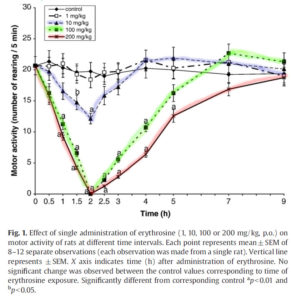 Pharmacology, Biochemistry, and Behavior. 92(2009): 574-582. Dalal, Poddar.
Pharmacology, Biochemistry, and Behavior. 92(2009): 574-582. Dalal, Poddar.
Long-term administration of Erythrosine B (Red 3) increased movement in a dose-dependent manner, but Dalal wanted to test a single large dose in vivo.
Dalal said Red 3 is known to increase calcium permeability in the neural membrane, and to effect the release of neurotransmitters like dopamine, GABA, serotonin, acetylcholine, norepinephrine, etc. It also inhibits brain magnesium, sodium, potassium and other ions.
The single high dose of Red 3 in this study elicited a significant reduction in vertical motor
activity (rearing) in young adult rats, with a maximum effect after 2 hours, and a slow return to the baseline.
Dalal explained that this reflected a decrease in regional serotonergic activity in the brain, in a time-dependent manner, affecting not only the hypothalamic serotonergic system but also the medulla-pons region.




















